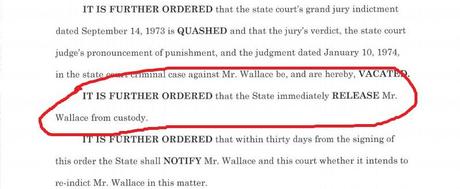Herman Wallace, a man who spent the vast majority of his life in solitary confinement in Louisiana’s Angola prison, will die in the free world. You can get the backstory in this piece Andrew Cohen wrote for the Atlantic just a few days ago. An excellent summary of the myriad legal issues involved in the case of the Angola 3 is also included with Mr. Cohen’s announcement below. It is impossible to know how many days of freedom Herman will enjoy. He is terminally ill and his loved ones were scheduled to visit him in his prison cell for final goodbyes. Now this bitter-sweet meeting will be taking place somewhere in the free air Mr. Wallace was denied for the entirety of his adult life. The big deal isn’t that Herman Wallace was denied a fair legal process, but that the legal system in Louisiana failed to correct an obvious problem when it had the chance. AGB

Judge Orders Angola 3′s Herman Wallace Released From Prison
Andrew Cohen
The Atlantic
U.S. District Judge Brian A. Jackson did a remarkably good and decent thing today — something that every judge should aspire to do in the right circumstances. He found a way to bring a small measure of justice to a man whose entire life had been rife with injustice. He found a way to order the immediate release of Herman Wallace, a terminally ill prisoner at the notorious Angola prison in Louisiana who spent 40 years in solitary confinement in a 6′ by 9′ cell for a murder there was no valid evidence he committed.
Last week, I wrote about this case here at The Atlantic because I felt it comprised so many of the failings of the American justice system. A black man whose trial is marked by racial animus. A defendant whose attorney does unconscionable work. A lack of physical evidence or adequate investigation. Co-defendants and state witnesses with obvious incentives to lie. Punishment that was both cruel and unusual. Deliberate indifference on the part of reviewing courts. It all happened to Herman Wallace. All of it and more; his case was a disgrace from the beginning.
Here is the link to Judge Jackson’s order. If you read it, you will discover that he did not focus upon any of these constitutional infirmities in granting Wallace the relief he sought. Instead, Judge Jackson held that the original indictment against Wallace, over 40 years ago, was constitutionally flawed because women were excluded from his grand jury. So you can add “equal protection violation” to the heap of ways in which Wallace’s rights were denied by our courts for four decades. Here is what the judge wrote:
The record in this case makes clear that Mr. Wallace’s grand jury was improperly chosen in violation of the Fourteenth Amendment’s guarantee of “the equal protection of the laws,” and that the Louisiana courts, when presented with the opportunity to correct this error, failed to do so…. Our Constitution requires this result even where, as here, it means overturning Mr. Wallace’s conviction nearly forty years after it was entered.
In the hours after the ruling was made public, state lawyers rushed to object to the judge’s ruling, arguing that Wallace, who is dying of liver cancer and may have only days to live, did not deserve to be allowed to be freed on bail while Louisiana decides whether to retry him or not. The conduct of these officials on this day is nothing if not consistent with Louisiana’s treatment of this man throughout his entire adult life — cruel and unusual to the bitter end.
At long last, Herman Wallace should be allowed to die in peace, and in freedom, as far away from that dreaded prison as his breath will take him. Let his miserable life and his early death become a symbol for all that is wrong about what America accepts today in its justice systems. Let it be a lesson, too, about perseverance and the ceaseless value of redemption. For decades, while he sat alone in that tiny, fetid cell, justice delayed to Wallace was justice denied to him. But today, while he is still alive to savor it, the law has turned away from injustice.
It is the first day of the rest of Herman Wallace’s life — and I sure hope it is not too late for him to enjoy it.
